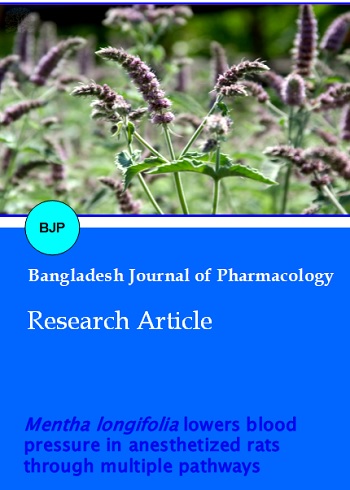Mentha longifolia lowers blood pressure in anesthetized rats through multiple pathways
DOI:
https://doi.org/10.3329/bjp.v11i4.27340Keywords:
Anesthesia, Blood pressure, Mentha longifolia, RatAbstract
This study was aimed to investigate the effect of the extract of Mentha longifolia on blood pressure and the possible mechanisms. In anesthetized rats, the crude extract of M. longifolia and aqueous and chloroform fractions caused a dose-dependent fall in mean arterial pressure. Atropine pretreatment abolished the effect of extract and aqueous fraction but did not change that of chloroform fraction. In rabbit aortic rings, crude extract relaxed phenylephrine (1 µM) and high K+ (80 mM) pre-contractions. Chloroform fraction was more potent against high K+, similar to verapamil and caused a rightward shift in the Ca++ concentration-response curves. Aqueous fraction partially relaxed high K+ pre-contractions. In rat aortic rings, crude extract and aqueous fraction-induced endothelium-dependent atropine-sensitive vasodilator effect. Extract and fractions also relaxed high K+ precontractions. In guinea-pig atrial strips, crude extract and chloroform fraction suppressed force and rate of contractions, similar to verapamil. In conclusion, M. longifolia lowers blood pressure through Ca++ channel blockade and atropine-sensitive-NO pathway.
Video Clip of Methodology:
Experiment using aorta: 2 min 35 sec Full Screen Alternative
Downloads
245
184 Read
60 Feature
40

Published
How to Cite
Issue
Section
License
Authors who publish with this journal agree to the following terms:
- Authors retain copyright and grant the journal right of first publication with the work simultaneously licensed under a Creative Commons Attribution License that allows others to share the work with an acknowledgement of the work's authorship and initial publication in this journal.
- Authors are able to enter into separate, additional contractual arrangements for the non-exclusive distribution of the journal's published version of the work (e.g., post it to an institutional repository or publish it in a book), with an acknowledgement of its initial publication in this journal.
- Authors are permitted and encouraged to post their work online (e.g., in institutional repositories or on their website) prior to and during the submission process, as it can lead to productive exchanges, as well as earlier and greater citation of published work (See The Effect of Open Access).
